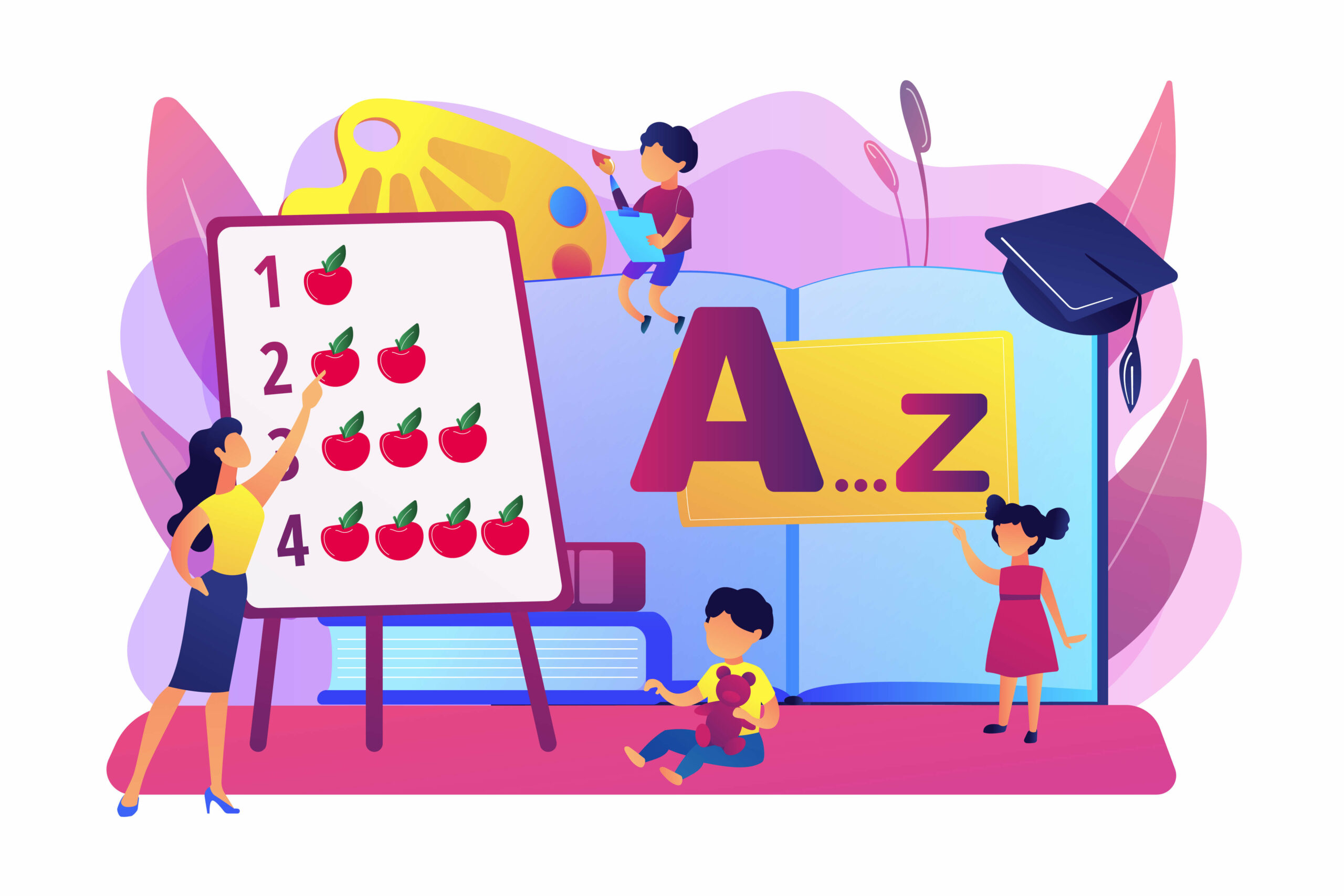Early childhood education lays the foundation for a child’s lifelong learning journey. Within this crucial phase, play-based learning emerges as a powerful approach that holds immense significance. By engaging in imaginative games and activities, children can embark on exciting journeys of self-discovery, creativity, and growth.
In this article, we will look at the importance of learning through play and how it can have a big impact on the development of kindergarteners. We can provide enriching experiences for our children to thrive by embracing the essential function that play serves in shaping tiny minds. In this article, we will learn how to unlock the transformative potential of play-based learning and its influence on children’s holistic development.
Also Read: When to Start Kindergarten: Advantages and disadvantages of starting kindergarten late
The Power of Play:
It may seem surprising, but childhood play isn’t just for fun— it is a powerful tool that allows children to play and learn simultaneously children can benefit greatly from play-based learning. Through immersive experiences, they develop critical thinking skills, deepen their knowledge of the world, and have fun. Meaningful social interactions during these moments provide a safe space for emotional expression without fear or judgment. A child’s natural medium of expression finds its voice through play, which also creates avenues for creativity and discovery. The process of playfulness inspires problem-solving skills while expanding dynamism, which is at the heart of experience-building. The inherent joy and freedom in play foster a love for learning and pave the way for holistic growth. By recognizing and harnessing the power of play, we can help children unlock their full potential and nurture their lifelong curiosity.
Also Read: Exploring Letters and Sounds: Early Literacy Skills in Kindergarten
Learning Through Play:
Play-based learning is a dynamic process that combines the joys of play with educational goals. It goes beyond traditional teaching methods, it allows children to play and learn, actively explore, experiment, and make connections through hands-on experiences. Essentially, when children take part in play-based learning activities, they become actively involved in shaping their education as they develop knowledge through personal experiences. Whether they are constructing towers with blocks, role-playing in a pretend kitchen, or engaging in a science experiment, children are actively learning through playing and observing. Play-based learning taps into their innate curiosity, fostering a deep understanding of concepts, and promoting problem-solving, critical thinking, and creativity. It is a powerful approach that nurtures a love of learning and lays a solid foundation for future academic success.
Play-based Learning in Kindergarten:
Kindergarten education is an ideal platform for play-based learning. Play is seamlessly integrated into the curriculum, providing opportunities for children to engage in purposeful play that supports their intellectual, social, and emotional development. Children explore diverse materials, engage in imaginative play scenarios, collaborate with peers, and solve problems through play. Teachers serve as facilitators, guiding and extending children’s learning while respecting their autonomy and creativity. By embracing play-based learning in kindergarten, we create a nurturing environment that fosters holistic development and sets a strong foundation for future academic pursuits.
Also Read: Exploring Letters and Sounds: Early Literacy Skills in Kindergarten
Key Benefits of Play-based Learning:
Foster Creativity and Imagination: Play-based learning fosters creativity in children. Providing them with an opportunity, to think outside the box. As they engage in imaginative play, they create new and different worlds, weaving intricate storylines and giving wings to their imagination. This approach enables them to develop original thinking skills and express themselves creatively.
Enhance Social and Emotional Skills: Play-based learning promotes social interaction, cooperation, and empathy. Children learn to negotiate, take turns, and resolve conflicts when they engage in collaborative play. They develop vital social skills, such as communication, teamwork, and understanding diverse perspectives. They also foster emotional intelligence.
Develop Language and Communication Abilities: Play provides a rich context for language learning. Through pretend play and interactive activities, children’s vocabulary is enhanced, conversational skills are practised, and storytelling is engaged in. They learn to express their thoughts and ideas, listen actively, and develop effective communication skills.
Strengthen Motor Skills and Physical Development: Play-based learning involves physical movement and manipulation, which contributes to the development of fine and gross motor skills. Whether it’s building with blocks, engaging in outdoor play, or engaging in sensory activities, children refine their motor skills, coordination, balance, and spatial awareness. The acquisition of different skills and competencies through play-based learning supports the overall growth of children, enhancing their readiness for future academic challenges and other life experiences.
Addressing Concerns and Misconceptions:
Although play-based learning offers many advantages, misconceptions and concerns about this teaching approach can often arise. Some may worry that play detracts from academic learning or that it lacks structure and discipline. However, the advantages of using a play-based approach for promoting the cognitive, social, and emotional development of children are widely recognized based on objective studies conducted over time. The findings from such research highlight several robust benefits that arise from these processes. Additionally, data indicate that engaging in these types of learning environments may lead to improved academic performance outcomes when compared to other approaches or to those who have not had similar experiences. It is crucial to dispel these misconceptions and to highlight the balanced integration of play and academic goals within a well-designed curriculum. Play-based learning is a holistic approach that nurtures the whole child, cultivating their love for learning while achieving essential educational outcomes.
Also Read: 10 Life Skills Activities for Kindergarten Students
Supporting Play-based Learning at Home:
There is no doubt that children spend a considerable proportion of their time outside of structured academic settings at home. This means that there are ample opportunities to introduce play-based learning approaches into daily routines.
It is up to parents to foster these educational opportunities for their children. This implies parental involvement by providing resources suitable for open-ended exploration, such as toys and various materials that allow for the exploration of different things. Engage your child in play, actively participating and extending their learning through meaningful conversations and questioning.
Incorporating play into your home will enable your child to explore their creative side while improving their imaginative skills greatly. Furthermore, finding community resources like parks and local libraries can be beneficial because they may have programs that encourage interactive learning.
Reinforcing the importance of fun in education helps create an encouraging environment in which children feel safe to thrive in both their social and intellectual development through game-based discovery.
Also Read: Effective ways to teach patience to children
Conclusion:
It is time to prioritise play-based learning in our children’s education. We must recognise the immense worth that play holds in fostering a child’s development. We should embrace play-based programs and advocate for their use in schools. We should create playful environments at home and actively play with our children. We should support organisations and initiatives that promote play-based learning. We owe our children fair chances for playful learning that can unlock their full potential. Through this method, we can facilitate creativity, fuel a lifelong desire for knowledge seeking, and promote personal development. It takes a concerted effort to fully endorse play-based education as a means of fostering academic achievement in children.
Play-based learning is essential for kindergarten curriculum development. Young learners develop cognitive, and social-emotional skills through play activities, such as games and pretend scenarios. This is essential for their holistic development. A pedagogical approach that incorporates hands-on experiences creates an enriched environment in which students thrive through curiosity-driven exploration of a variety of subjects that are infused with fun elements. In addition to academic subjects, learning by playing promotes creativity and imagination, while also improving communication skills and regulating emotions during interactions with peers and adults. Fun-filled environments boost long-lasting memories more than anything else.
At EuroSchool we empower children by regularly introducing diverse playful activities so that they can learn effectively and embrace their own unique ways of absorbing knowledge. We ensure that these vibrant learners mature into fulfilled individuals by nurturing their development through the effective incorporation of creative methods of pedagogy in our school classrooms.











